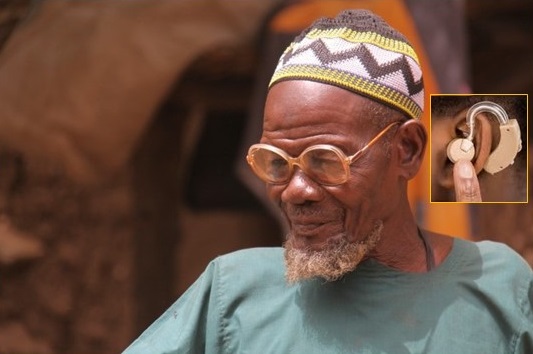Hearing Aids Help Reduce Loneliness in the Elderly, Research Shows
By Adebowale Bello. B.Tech Microbiology, Freelance Health Writer. Medically reviewed by the DLHA team.

Photo of an elderly African man seated leisurely with a hearing aid inset behind the left ear.
Partial image credit: Freepik.
As people grow older, a quiet battle often begins. A battle that’s not always visible to the eye or loud enough to draw attention. It’s the slow fading of sound. Many older adults begin to struggle with hearing but they often brush it aside as a normal part of aging.
The impact, however, runs much deeper than simply missing a few words in conversation and this is because hearing loss can make people feel cut off, alone and increasingly isolated from the world around them.
A recent study has brought new insight into this issue showing that treating hearing loss can help the elderly stay socially connected and reduce feelings of loneliness. This can help shape how we care for our aging population, especially in Africa where community and conversation are central to daily life.
The research was carried across 4 U.S states namely, North Carolina, Mississippi, Maryland and Minnesota and it formed part of a larger trial called the ACHIEVE study (Aging and Cognitive Health Evaluation in Elders). It involved 977 adults aged 70 to 84 who had some degree of untreated hearing loss.
These participants were randomly divided into two groups. One group received a full hearing intervention that included hearing aids, four sessions with an audiologist and tailored education on how to use their devices. The second group was given general health education focusing on topics like chronic illness prevention and healthy aging, but they didn’t receive hearing aids or any hearing-specific support.
Over the course of three years, researchers looked at how these two groups fared socially. They measured the number of people that participants interacted with regularly, the variety of those relationships (for example, whether they connected with family, friends or neighbours), and how meaningful those interactions were. They also asked the participants how lonely they felt over time.
What they found was both compelling and hopeful. People who received the hearing intervention were able to maintain stronger, more diverse social connections than those in the control group.
On average, they had one more person in their social network by the end of the study. Their relationships also remained richer and more supportive and their sense of loneliness improved slightly. In contrast, those in the general health education group saw a small but steady increase in their feelings of loneliness and a decline in their social ties.
These findings may seem small on the surface (a single extra friend, a slight drop in loneliness) but in the world of public health, these changes are meaningful. Loneliness and social isolation in older adults have been linked to depression, faster cognitive decline, heart disease and even premature death. Hearing loss, if left unaddressed, can quietly push people away from the very things that make life joyful such as conversation, music, family gatherings, community events and spiritual life.
First, it highlights an issue that doesn’t often get the attention it deserves. In many African cultures, older adults are central to family life. They play important roles in advising, storytelling, community leadership and childcare. But if hearing loss keeps them on the sidelines, their involvement and sense of belonging suffer. This can be particularly harmful in rural or tight-knit communities where face-to-face communication is key.
Second, the study shows the real value of treating hearing loss, not just to improve sound but to preserve the social and emotional health of our elders. Unfortunately, hearing aids are often expensive or hard to find in many African countries. Even where they are available, stigma, lack of awareness and limited access to professional care can prevent people from seeking help.
We can’t afford to overlook hearing care. This study makes a strong case for including hearing checks in routine health visits, especially in primary health centres. Local governments and health NGOs can also help by providing affordable hearing devices, training health workers in basic ear care and raising public awareness about the signs and risks of untreated hearing loss.
In a continent where oral culture, music and community life are so important, we must do everything we can to keep our dear older ones engaged and connected. Simple solutions like ensuring religious centres use clear sound systems or encouraging families to check in more often with their loved ones can also make a big difference.
Hearing care isn’t just about sound, rather it’s about dignity, belonging and mental well-being. If we ignore hearing loss in older adults, we risk pushing them into loneliness and silence but if we act, even in small ways, we can help them continue to thrive within the family and community.
Source: Reed NS, Chen J, Huang AR, et al. Hearing Intervention, Social Isolation, and Loneliness: A Secondary Analysis of the ACHIEVE Randomized Clinical Trial. JAMA Intern Med. Published online May 12, 2025. Available from here
Related: Hearing Loss Can Increase Heart Failure Risk, Study Warns
Published: June 23, 2025
© 2025. Datelinehealth Africa Inc. All rights reserved.
Permission is given to copy, use and share content for non-commercial purposes without alteration or modification and subject to attribution as to source.
DATELINEHEALTH AFRICA INC., is a digital publisher for informational and educational purposes and does not offer personal medical care and advice. If you have a medical problem needing routine or emergency attention, call your doctor or local emergency services immediately, or visit the nearest emergency room or the nearest hospital. You should consult your professional healthcare provider before starting any nutrition, diet, exercise, fitness, medical or wellness program mentioned or referenced in the DatelinehealthAfrica website. Click here for more disclaimer notice.